Astana overview
Astana is the capital of Kazakhstan located in Akmola Oblast. This city (former known as Tselinograd and Akmolinsk) lies along the Ishim River at the junction of the Trans-Kazakhstan and South Siberian railways.
In 2019, Astana was renamed Nur-Sultan - in honor of Nursultan Nazarbayev, the first president of Kazakhstan. In 2022, the name Astana was returned to the city.
The population of Astana is about 1,328,000 (2021).
The phone code - +7 7172; the postal code - 010000.
Astana night view
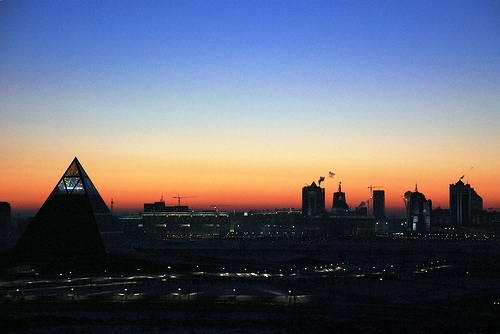
Astana history
Known as Akmolinsk (Kazakh akmola, “white tomb”) until 1961, Tselinograd (Celinograd) until 1997 Astana was founded in 1830 as a Cossack advanced post. Later a small fortress grew into a town. In 19th century Akmola became an important geopolitical center of the region actually being the center of the whole district.
Astana population reached 33,000 when the town received the status of oblast (region) center in 1939.
Soviet Virgin and Idle Lands Campaign in the mid-1950s (Tselinograd is Russian for Virgin Lands City) and Astana city role as capital of the region that united the five northern oblasts of Kazakhstan in 1960-1965 greatly enhanced its importance.
It led to much new construction and the setting up of various research and higher educational institutions in Astana city. Teacher training, agriculture, medicine, engineering and construction institutes were built in Astana.
In 1992 the city was renamed into Akmola. The word “Akmola” in Kazakh language means “White Grave” or “White Sacred Place”. On May 6th, 1998, by Kazakhstan President’s decree the city Akmola was renamed into Astana.
Astana streets
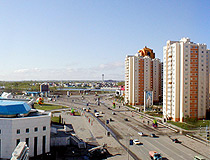
Astana city street view
Author: Alexander Suhocky
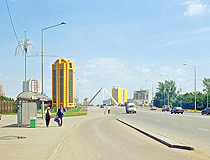
Astana city street scenery
Author: Alex Yakon
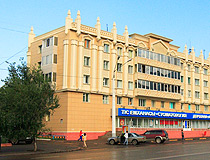
Astana city, Kazakhstan street
Author: Andrey Bogdanov
Astana facts
In 1997 Kazakhstan’s capital was moved to Astana city from Almaty to take advantage of Astana location as it is much more accessible to Russia and much smaller chance of earthquake.
Russian city Orenburg was the first capital of Kazakhstan (Kirgizskaya ASSR in the RSFSR) from 1920. In 1925 the republic received the name Kazakhskaya ASSR, the capital was transferred to Kzyl-Orda. In 1927 the capital of Kazakhstan was again transferred, this time to Alma-Ata. In 1936 Kazakhstan was separated from RSFSR – Kazakhstanskaya SSR was formed.
Officially Astana was declared the capital of Kazakhstan on December 10th, 1997. International presentation of Astana as a new capital took place on June 10th, 1998. The Capital Day is a state holiday.
Astana city is becoming a new cosmopolitan western-style city with skyscrapers and offices of intercontinental oil corporations.
The majority of Astana city population is employed in transport (railways). Various types of agricultural machinery are also produced in Astana.
Astana transport system
Astana is a big highway juncture: Highways M36 Chelyabinsk - Almaty and A343 Astana - Petropavl cross the territory of the city.
It is planned to construct Astaninsky high-speed light-rail transportation LRT (light metro, high-speed tram) as well as normal tram.
There is a modern international airport in Astana city able to handle all kinds of jets. The airport is 16 km far from the city.
Astana sceneries
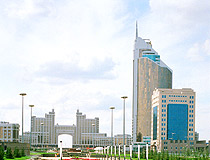
Astana city, Kazakhstan scenery
Author: Alex Yakon
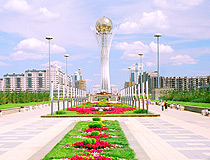
Astana city scenery
Author: Alex Yakon
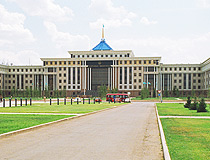
Astana city architecture
Author: Alex Yakon
Astana features
The location of Astana city is strategically advantageous crossroads of caravan ways which attracted inhabitants of the Steppe for a long time.
Archeologists find objects which date back to Bronze Age, early Stone Age and Middle Ages. Among main historical objects within Astana there is the site of ancient settlement Bozok - a monument which was in function beginning in early Middle Ages (7th-8th centuries) till Kazakh Khanate epoch (15th-16th centuries).
In 1999 on UNESCO decision Astana received the name - the City of Peace. After the city received the status of the capital and special economic area “Astana - new city” was organized a lot of modern architectural projects have been carried out in the city.
In spite of its status of the capital Astana still falls behind the former capital of Kazakhstan Almaty in its infrastructural resources. Almaty preserved its mentality of the capital keeping an unofficial status of the “southern capital”.
Astana attractions
There are four universities in Astana, Akmolinskaya regional philharmonic society, museums (historical and of local study, arts museum,), theaters (National opera and ballet theater named after K.Baiseitiva, Kazakh theater of music and drama named after K.Kuanyshbayev, Russian drama theater named after M.Gorky) and libraries. Also there is the Congress-Hall, Youth Palace and Presidential Culture Center.
On July 6th, 2000, a fountain “Life Tree” was constructed after Azat Boyarlin’s design, it received the name “Chupa-Chups” due to the alike shape. On the four sides of the fountain there are animals figures - an ox, a horse, a camel and a ram. Every figure of the animal has the head of a dragon - symbol of wisdom. The construction itself is rather of symbolic character, it reflects eternal life rotation.
Among the main places of interest of Astana city are:
- Ak-Orda - the residence of Kazakhstan Republic President;
- Baiterek building - main symbol of Astana city;
- Independence Palace - the building where diplomatic and other international affairs take place;
- Palace of peace and concord - the building where Congresses of world and traditional religions leaders are held.


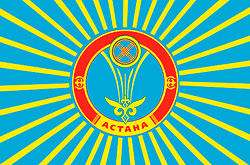
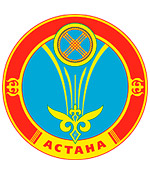







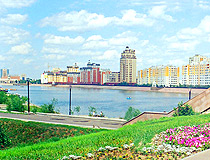
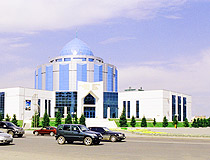
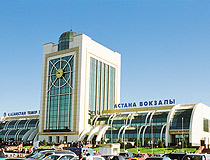
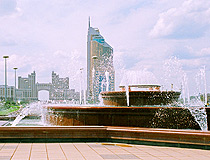
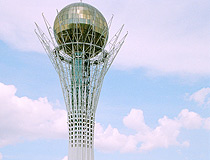
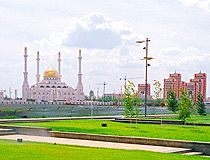
The comments of our visitors